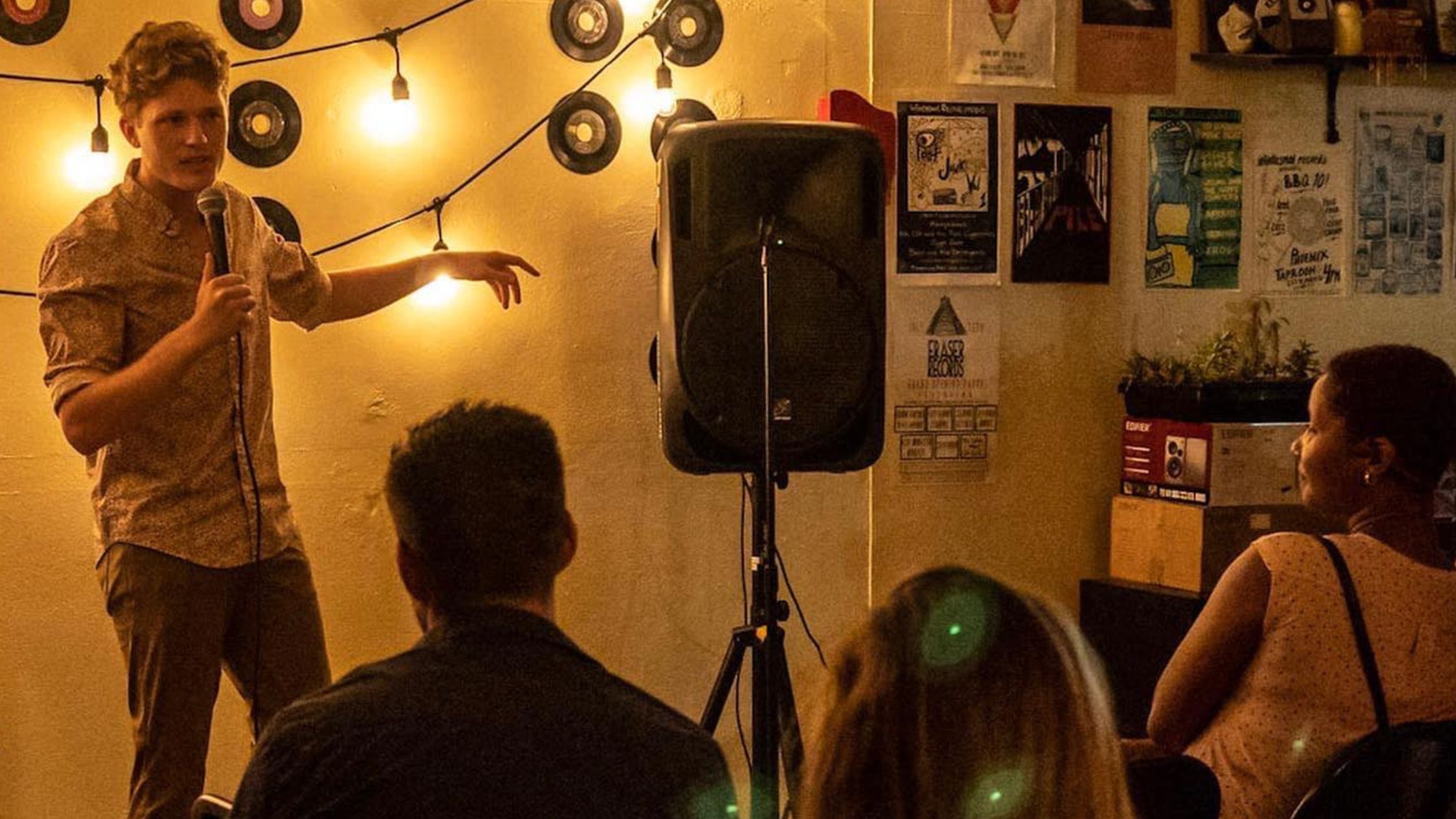Behind the Laughs

We had the pleasure of having Andrew Gaffigan on the EncoreNOW podcast. He’s a rising star in the world of stand-up comedy. He shares what the early years are like and his outlook for eventually making comedy a full-time profession.
From Idea to Applause
Every comedian has their unique rhythm when it comes to crafting the perfect joke, and Andrew Gaffigan is no exception. His journey from an idea to a punchline is a blend of creativity, intuition, and relentless refinement.
For Andrew, comedy often springs from real life. He doesn’t just sit down to “write a joke.” Instead, he waits for genuine experiences or observations that strike a chord. It could be anything – an overheard conversation, a peculiar event, or just a fleeting thought.
Once an idea catches his attention, Andrew indulges in free writing. He lets his thoughts flow, often for about 10 to 20 minutes, jotting down everything that comes to mind without filtering or editing. This initial draft undergoes multiple revisions. He tightens up the free write, carving out the fluff to distill the core essence of the joke. This might take several iterations, with each one getting closer to that final punchy version.
Andrew doesn’t work in isolation. He listens to other comedians, often catching valuable nuggets of wisdom from their experiences. While online resources can provide the basics, the true art and craft of comedy are often learned from peers and by being on stage. Moreover, he’s not hesitant to discard material that no longer works or resonates. His act is continuously evolving, keeping it fresh and relevant.
The real test of a joke is in its reception. Andrew believes in taking his material to the stage as soon as he feels it’s ready. The audience’s reaction is the best feedback he can get. If a joke falls flat, he’s back to the drawing board, making tweaks and adjustments.
Not every set goes as planned. There are times when the audience might not resonate with certain material. Andrew’s vast repertoire allows him to pivot during such moments. If jokes about one theme aren’t hitting the mark, he seamlessly transitions to another topic, ensuring the audience remains engaged.
Andrew’s process is a dance between intuition and intellect, between spontaneous creativity and deliberate crafting. It’s this blend that makes his comedy resonate with audiences.
Day Jobs and Comedy
Many assume that stand-up comics have it made once they hit the stage. But the reality is less glamorous. Andrew sheds light on the challenges of making comedy pay the bills and the journey to potentially making it a full-time profession.
Andrew candidly shares that only a fraction of his income comes from comedy. The dream is to one day make comedy his primary source of income, but the benchmark is clear: he would consider leaving his day job only when his earnings from stand-up match his regular job’s income for two consecutive years.
Every comedian dreams of headlining shows, touring, and perhaps even having their specials. But the path to that dream is paved with challenges. For many, including Andrew, it involves being on the road, opening for other comics, and continually seeking opportunities to perform. The goal is to one day transition entirely to comedy, but until then, the day job remains an essential anchor.
Scam Likely
In the world of comedy, getting noticed is half the battle. Andrew discusses the importance of creating tapes for showcases and the intricacies of sending them out to festivals and bookers. While entry fees range from $15 – $40 and the compensation is sometimes only enough to cover gas, it’s the connections and practice that make it all worthwhile.
While paying your dues is part of the journey, so is dealing with scams and unreputable companies. Andrew recently found himself at the crossroads of a potential manager scam. On an early Saturday morning, Andrew attended a group interview with a local talent manager. “She’s like, ‘I’ve been in the business for 30 years, and I can tell a winner and I can tell a loser just by looking at your faces.’” he recounts.
Each person at the interview was instructed to recite a few lines as a test for an ad campaign. Andrew admittedly delivered his lines very blandly. “She said that she would call us back only if she wanted us. The next day, I got a call from her, and she was like, ‘I loved it. I want to sign you. I just need you to give me $1,500, and I’ll make all your dreams come true.’ And I was like – gross!”
While Andrew could see the red flags, he worries about others who could be taken advantage of – especially when someone is promising you the career you want.
Conclusion
Andrew’s journey is one of passion, perseverance, and a lot of laughs. We were left with a renewed appreciation for the world of stand-up comedy and the artists who make it vibrant.
